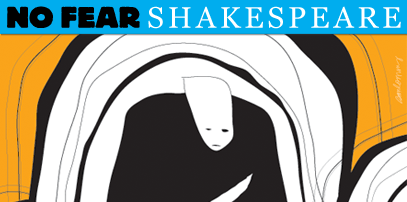Not because someone told me to, but because I think if it's there, why not read it? Why not see what all the hubbub is about, you know? Them that's educated tell us he's the best, but I can assure you we did not have a Shakespeare Festival in Buna, Texas.
So, I thought, "You know, I just just read these things." But the language is so foreign, I never started.
Not unlike when I determined, as a preacher's kid, to read through the whole Bible. (I kinda made it, if "looking at the words" means reading through it. I was probably too young to absorb it in any real detail. I mean, once you get into the begats and slog through through the religious laws and the incomprehensible histories, you still have poetry and metaphors abounding. I'm not sure where I petered out. Probably in Song of Solomon. A little gay boy can't endure endless description of alabaster breasts.)
So, it was with great joy that Jake Wesley John pointed out this set of books at the theatrical bookstore in midtown, which is conveniently near the discount big box store with the wall of pre-packaged Indian food, each priced at two bucks a pop.
The books, called "No Fear Shakespeare" are divided in two. On the left hand page are the original words of Shakespeare. On the right hand page is a "translation" into modern English. The modern English is inartful, probably intentionally. The plain meaning of the grammar and historical references are there merely help you understand his words. (In looking for a link, I discovered that they have put everything online. I prefer a book, since I want to write notes in it. But it's good to know it's there.)
I started with Twelfth Night. Read it again. Then read Hamlet and read it again.
The little mission I had given myself was to find one soliloquy and perform it for Andy Gale's class. But nothing stuck out for me. Yes, I was understanding, finally, the plays themselves -- that is, I could look at the words and understand the grammar; but actually understanding them? People spend lifetimes trying to understand them -- but I was just wandering blindly. Honestly, I chose Hamlet because it was, you know, the most famous.
Finally, my friends from England, Adam and Nicky Derrick, who run a theater school, suggested my next read be The Merchant of Venice, most famous for the phrase "a pound of flesh". So, I started it. Had I ever seen it before? I didn't know. I remember scenes from it. It was jarring as I dove in.
I was startled by how viciously careless the "Christians" were in their hatred of Jews -- probably common for Shakespeare's time -- but also how Shakespeare managed to humanize and let us sympathize with the plight of the hated villain, Shylock. Because deeply embedded is also the great "If you prick us, do we not bleed" speech.
Even though the play ultimately tilts against Shylock, the point is made. People are people.
Now that was a great read. And I found my monologue!
If anyone else wants to join me on this little venture, just put a comment below. I plan to revisit Twelfth Night and Hamlet again. So, just jump right in with The Merchant of Venice. And tell me what monologue or scene you could see yourself doing.
CURRENT SHAKESPEARE PLAY: THE MERCHANT OF VENICE.

1 comment:
Comedy of Errors next! And remind me to tell you about the Merry Wives Musical I saw in 2006 at the RSC...some ideas are floating...!
Post a Comment